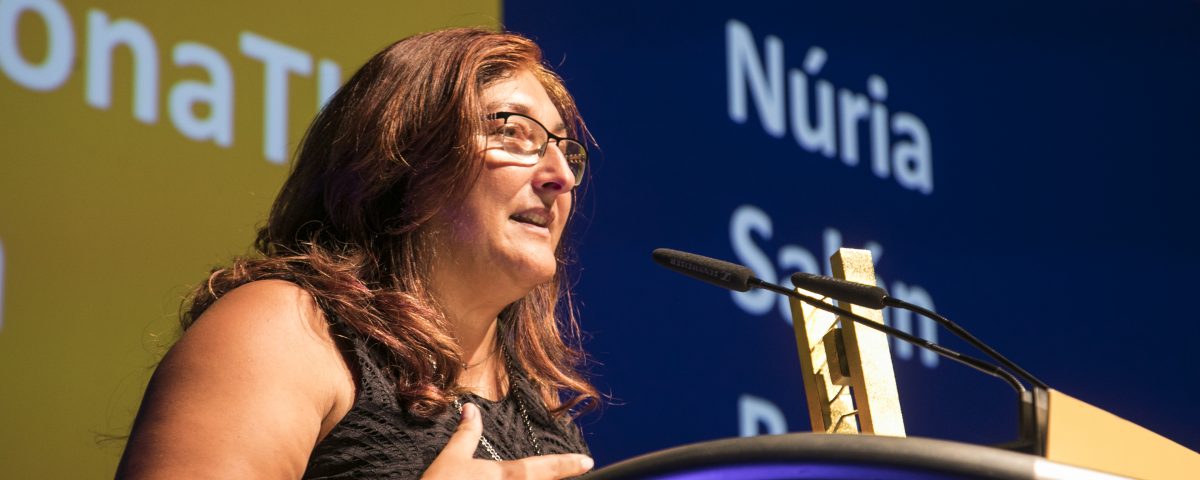Núria Salan about STE(A)M community in Catalonia


Núria Salán Ballesteros (Barcelona, b.1963) is a Catalan chemist, professor at the Polytechnic University of Catalonia (UPC) and current president of the Catalan Society of Technology (SCT). Last year, she won a Special Mention from the DonaTic Awards, which accredit the excellence of talent and female digital entrepreneurship in Catalonia.
We spoke with her about the STE(A)M community in Catalonia.
- In your opinion, which is the situation of the maker and STE(A)M movement education in Catalonia? Incipient or initial, in development or in consolidation?
The maker movement, during this first period of confinement by COVID-19, has revealed itself as a collaborative movement with immediate and highly effective solutions, in such a way that the image that a part of society could have of the maker movement is “a group of geeks”. But more than ever, the solutions provided by this movement in all its forms (3D printing, sewing, mechanical assembly groups, etc.), have been essential to improve the quality of life for many and many people. An applause!
- Do you think we have significant groups of expertise in STE(A)M education in Catalonia ?
Yes, definitely! Personally, I have rediscovered a group of technology teachers from all over Catalonia, who have turned to offer their tools, their material, their time and their know-how to help organize a project like Telecomunicat.cat. Through this project, mobile devices are supplied to people affected by COVID-19 in public hospitals in Catalonia, to support health personnel and that there are no missing vents, supports for masks, safety screens or other items. And I say “rediscovered” because I already knew a good part of the things they did, but I have verified their ability to make immediate, creative proposals, redesign elements, etc. This teaching team are the best STE(A)M references that we have right now. We have a lot of talent and many expert people among our technology teachers!
- Has the demand and interest of the teaching community on these topics been growing?
Inevitably yes. There has been a lot of curiosity to know how robots that can make 2,400 PCR tests a day or ASSUM devices that sterilize sanitary spaces have been designed and manufactured, with the collaboration of people from all over the world to take them to the hospitals of Catalonia. This curiosity has led to the emergence of groups like Covidwarriors.org. It was time!
- Do you think that the teaching teams have enough resources?
With what we have done so far, we have enough to do initial training in technology at schools. Now, after which we have seen and lived, ICTs have been the undeniable protagonists to guarantee communication and to avoid the isolation of society in this situation of confinement, therefore, ICT terminology that was not common to society now is. In any case, what we have lacked more is resources rather than knowledge… We have adapted to virtual classes, to guarantee virtual learning scenarios, to convert practical content into digital, but it is not very useful if our students can not access. The digital gap has revealed that not everyone has the same opportunities. This has been the main inconvenience for teachers.
- How do you value the training of teachers on the subject? And the quality of the projects that are presented from the different centres?
There are teachers who have a lot of and very good training because they have been organizing activities for years like Robolot, Roboresme, Robotseny, Tramuntec, technology fairs, Mercatec, etc. and have offered to do “not expert” teacher training. What we have also detected is that a part of the teachers have not felt like adapting. Those who wanted to train, have found training scenarios, created by colleagues, like CESIRE network. We can say that we will start 2020-21 course with a “renewed” teacher team in technological skills (who wanted to renew them, naturally). But I am afraid that the scope of activities carried out by public school teachers has had a very diverse reception by students, because it has been subject to the abilities and resources of the students (availability of PCs or tablets, WIFI availability …). Again I refer to the fact that the digital gap has been very marked.
- What strategies do you think can best serve to extend and broaden the reach of this movement and resources within the educational community?
That teachers know that what they propose can be done and that their students can enjoy it. And let them know that they can count on the support of their centres. I think teachers who have spent more time and hours preparing material, training, supporting, etc., should be recognized for that.
- Do you think that this type of activities, projects and experiences can serve to democratize access to technology, or is there a risk of generating elitist spaces of exclusivity?
On the one hand, the situation has let clear that there is a (large) part of the technology that is much more accessible than it might seem, and we can enjoy impressive ICT offers. This has allowed us to stay connected, in a fairly globalized way, and the appearance of devices that require little to function (open software, free software, open platforms) have contributed to democratizing part of this technology. But, of course, there is still a perception that technology, and studies related to technology and engineering, are elitist. And it should be emphasized that this perception is totally wrong and out of place. In the past, engineers were important gentlemen, with ties, who made a lot of money (or much more than factory workers), but there were also many people who did “magic” without wearing a tie (and without collecting the salaries of the gentlemen). I mean by this that engineering and technology is present in many jobs and tasks from our day to day. We need TECH talent in all these areas, with diversity, with parity, with all kinds of points of view.
- Did you think that this theme helps or hinders gender work (and the gap) within technical-scientific vocations?
Yes, inevitably an important gender gap is generated. Girls are more attracted to vocations more linked to “saving the world”, and do not perceive that technology means too to “save the world”. On the other hand, boys (and I speak in general, no one takes it badly) are attracted by initiatives more related to leisure, competitiveness, etc. If a girl says she likes cars, there are still people who don’t see it as something normalized. This, in the middle of the XXI century, causes female vocations to be lost from the beginning of the formative stage. On the other hand, if any examples of technology will be applied to quality of life (health, medicine, etc.), many girls (and boys) would receive the message and incorporate it. Early childhood and primary education is key in this “recruitment of talent”.
- Comparing with experiences and realities of the countries of our environment at an international level, what do you think is the role of Catalonia within the international maker movement? Do you think that the projects carried out here have recognition and sufficient visibility abroad?
Personally, I believe that we can talk “from you to you” with international makers of recognized prestige. I have visited FABLABs in Berkeley and Cambridge, and we have nothing to envy from our FABLABs. I think we have the capacity, skills and talent perfectly comparable to that of others maker communities that have recognition because they have visibility. We still need a recognition of talent in our country. Catalonia can become a pioneer in this impulse of the talented community, with recognition and giving it the value it deserves. We can do it!
- Any project, resource or experience that you want to highlight?
I have said that the experience of Telecomunicat.cat has been very enriching for me during this first confinement by COVID-19. We saw that we could organize more than 80 people from all areas and TECH-ICT profiles that they didn’t know each other who knew each other and we accepted a fairly horizontal organization chart of people to move forward all together. It has been exciting! We have worked a lot, we have spent many hours, but it was worth it to see some image like a mother who could see her baby through a mobile phone. Technology has helped a lot in this terrible situation.
By Colectic


